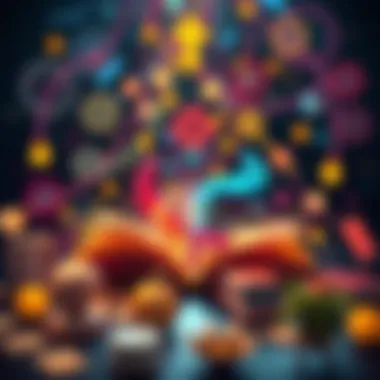Transformative Books for Personal Growth and Insight


Intro
In a world overflowing with information, literature still holds a unique power to inspire change and growth. Books have the ability to open our minds to new possibilities, allowing us to reevaluate our perceptions, values, and life choices. Whether it's a towering classic or a contemporary gem, reading can lead us down paths of self-reflection and understanding that transform our very being.
But what does it really mean for a book to be life-changing? The answer lies in the experiences and insights shared between the pages, serving as mirrors to our personal journeys. Many readers find that certain narratives resonate deeply with their own struggles, aspirations, or existential inquiries. These connections can lead to profound realizations, making the act of reading not just an escape, but a launching pad for personal evolution.
In this exploration, we'll delve into key themes across a variety of transformative works, pulling apart the insights that can contribute to individual growth. We’ll discuss the minds behind them—authors who dared to tackle complex ideas and emotions in ways that speak to the human experience. Each suggestion will serve as a potential tool, nudging readers toward insight, introspection, and ultimately, enlightenment.
Thus, we embark on this journey through the written word, ready to uncover the layers of meaning that can influence, shape, and sometimes redefine us.
The Concept of Life-Changing Literature
When we discuss life-changing literature, we step into a realm where words hold power. This power can inspire us to rethink our choices, challenge our beliefs, or encourage a shift in our perspective on life itself. Life-changing books are not merely stories; they're compasses guiding us through the tumultuous waters of existence. Their narratives resonate on a personal level, allowing us to find pieces of ourselves within the inked pages.
Defining Life-Changing Books
Life-changing books can be defined as texts that provoke deep self-reflection or provide insights that lead to significant shifts in our behavior, attitudes, or understanding of the world. Contrary to common belief, these books do not need to be bestsellers or classics to have an impact. Instead, what truly matters is the connection a reader forges with the material. Just as a good friend can influence your thoughts or life choices, so can a book.
For any literature to be labeled as life-changing, it often contains key elements:
- Relatable Characters: Individuals whose journeys mirror our own struggles, fears, or aspirations.
- Universal Themes: Ideas such as love, loss, or redemption that speak to anyone at any stage in life.
- Provocative Questions: Texts that challenge us to ponder our values or assess our life choices.
These components create a breeding ground for personal growth and transformation. Each reader's experience is unique; one person may find solace in a memoir, while another may gain clarity from a fictional tale. Ultimately, the definition of a life-changing book is as diverse as the readers themselves.
The Impact of Reading on Personal Growth
Reading is akin to engaging in a dialogue with diverse perspectives. The impact of literature goes beyond mere entertainment; it's an invitation to step into another's shoes and view the world through their lens. This empathetic exercise can have a profound effect on one’s personal growth. When we engage with different narratives, we broaden our understanding and cultivate tolerance for differing viewpoints.
The benefits of reading in relation to personal growth are manifold:
- Enhanced Empathy: Immersing in stories nurtures our ability to understand emotions and situations outside our immediate experience.
- Intellectual Curiosity: Exposure to complex ideas can ignite our interest in various fields like psychology, sociology, or philosophy, encouraging lifelong learning.
- Shaping Identity: As we encounter different life experiences through literature, we confront our beliefs and values, which can reshape our identity over time.
"Literature is the most agreeable way of ignoring life." — Fernando Pessoa
In essence, literature can be a life raft, providing us with the tools to navigate our world more effectively. As we explore the vast expanse of literature, we discover that each book holds the potential to redefine aspects of who we are and influence the paths we choose.
Thus, the concept of life-changing literature is embedded in the transformative relationship fostered between the reader and the text. Its significance stretches far beyond pages filled with words; it lays the foundation for enlightenment and self-discovery throughout our lives.
Classic Literature That Transforms
Classic literature holds a significant place in the realm of life-changing books. These texts, often written in a different time, grapple with themes that resonate across generations. They not only reflect the cultural, social, and moral fabrics of their time but also provide profound insights into the human experience. Reading such literature encourages introspection, making us reflect on our beliefs, values, and choices in life.
Furthermore, classic works often lay the foundations for modern storytelling and thematic exploration. The characters and narratives crafted in these texts can offer solace or challenge preconceived notions, leading to a richer understanding of ourselves and the world around us.
Analyzing Timeless Works
Pride and Prejudice by Jane Austen
Pride and Prejudice, written by Jane Austen, dives deep into the complexities of relationships and social class. One specific aspect to highlight is Austen's sharp wit and keen observation of human behavior. This novel addresses themes like love, class, and individuality in a society that often constrains its characters. The dialogues are vibrant, and the characters are extraordinarily relatable, demonstrating human follies that can feel timeless.
Notably, the key characteristic of Pride and Prejudice is its clever critique of social norms through the lens of romantic entanglements. It's a beneficial choice for readers wanting to understand how societal expectations shape our lives. The unique feature of the narrative is its emphasis on personal growth; Elizabeth Bennet's journey toward self-awareness shows how crucial it is to remain true to oneself among external pressures.
However, the novel might initially seem like a simple romance, but it challenges readers to examine the intricacies of character judgment and the need for personal integrity.
by George Orwell
George Orwell's 1984 explores the mechanisms of power, totalitarianism, and personal autonomy. A particular aspect worth noting is its grim portrayal of a dystopian future where individuality is suppressed. The novel serves as a harsh reminder of the consequences of unchecked governmental power and the fragility of truth.
One key characteristic is its innovative use of language, particularly concepts like "Newspeak" and "doublethink". These ideas challenge the reader to reflect on the language they use in their daily lives and how it shapes reality. 1984 has garnered significant attention due to its relevance in discussions about personal freedoms and state control, making it a vital read in today's world.
While the narrative may come off as bleak, the cautionary tales within encourage critical thinking and a reevaluation of our societal structures and authoritative messages.
Siddhartha by Hermann Hesse
In Siddhartha, Hermann Hesse presents the journey of spiritual self-discovery. The novel is deeply rooted in themes of enlightenment and the quest for meaning in life. One specific focus here is Siddhartha’s personal quest, which highlights the importance of self-exploration and the acceptance of life’s dualities.
The key characteristic of Siddhartha is its rich symbolism, especially the river, which serves as a metaphor for life itself—ever-changing yet constant. For readers looking for internal reflection, this book is immensely helpful in understanding the various paths one can tread to find personal truths.
While the narrative encourages exploration of different life philosophies, it can sometimes feel abstract, leaving readers longing for definitive answers. Nonetheless, the lessons learned are invaluable for those on their own journeys of self-understanding.
Key Themes in Classic Literature
Classic literature often revolves around key themes that explore the depth of human experience. Let's look at a few:
- Love and Relationships: Many classic works dissect the complexities of love, revealing its many forms and the societal factors that influence it.
- Social Class and Inequality: These texts frequently critique the class systems of their time, encouraging readers to question their own societal structures.
- Identity and Self-Realization: Characters often embark on journeys that highlight the importance of knowing oneself, which resonates with modern-day readers trying to navigate their identities.
- Morality and Ethics: Many classic authors grapple with questions of right and wrong, prompting deep reflections on personal and societal morality.


In exploring these themes, readers encounter narratives that not only provide context to different eras but also provoke thought about their own lives through the lens of timeless issues.
Modern Classics and Their Influences
In the landscape of literature, modern classics hold a significant place, serving as both mirrors and windows to contemporary society. These works not only reflect the collective anxieties and dreams of their times but also resonate deeply with readers, often leading to profound personal transformations. Understanding the influence of these narratives reveals how they shape our thoughts, challenge societal norms, and guide individuals towards self-discovery and growth. The modern classics discussed in this section illustrate this dynamic relationship between literature and life, showcasing texts that provoke thought and inspire action.
Exploring Contemporary Transformations
Modern literature serves as a powerful catalyst for reflection and change. It addresses the complexities of the human experience, often distilled through unique perspectives and engaging narratives. Below, notable titles that exemplify these themes are explored, shedding light on their lasting impact.
The Alchemist by Paulo Coelho
The Alchemist is a story steeped in the wisdom of following one’s dreams—its core message revolved around the idea that each person has a personal legend to pursue. Coelho's use of simple yet profound language captivates readers, encouraging them to dig deep into their own aspirations. The key characteristic of this book is its allegorical nature; it presents a journey that is both literal and metaphorical.
This novel has become a beloved choice for many seeking inspiration due to its accessibility and rich themes. One unique feature is its universal appeal; regardless of cultural background, readers find solace in its message. This can be particularly advantageous for newcomers to the world of self-help literature, providing relatable content without overwhelming complexity. However, some might argue that its simplicity risks trivializing deeper existential questions.
The Catcher in the Rye by J.D. Salinger
The Catcher in the Rye presents a more turbulent journey through adolescence. The protagonist, Holden Caulfield, embodies the struggles of youth—alienation, identity crises, and the search for authenticity. Salinger’s unfiltered portrayal of a young person's turmoil makes this work particularly resonant among readers navigating similar challenges.
Its raw, conversational style allows a direct connection to the characters and their plight, making it a compelling read for those examining their own lives. What sets this novel apart is its ability to evoke strong emotional responses. However, the heavy themes might not resonate with all; some readers may find Holden’s cynicism exhausting or relatable to the point of discomfort.
To Kill a Mockingbird by Harper Lee
Harper Lee's To Kill a Mockingbird delves into themes of racial injustice and moral growth through the innocent eyes of Scout Finch. This novel instills a profound sense of empathy, inspiring readers to reflect on their own views of justice and compassion. The story’s strength lies in its rich character development and the nuanced portrayal of complex social issues.
A noteworthy aspect of this book is its capacity to stimulate critical discussions about ethics and human behavior. Its relevance today underscores the ongoing struggle against prejudice—making it a timeless read. However, the historical context might leave some feeling detached or underwhelmed, as the stark realities presented can be hard for modern readers to confront.
Impact of Modern Writing Styles
As literature evolves, so does the way stories are told. Modern writing styles bring fresh perspectives and methodologies that reflect the changing world. These adaptations in narrative structure, voice, and language not only enhance readability but also allow authors to articulate their thoughts in more innovative manners. This section provides insight into how contemporary styles contribute to deeper understanding and engagement with the text, fostering a connection that can lead to significant life changes for readers.
Reading engages the mind and heart, leading to transformation beyond the page. As we explore modern classics, it becomes clear that literature is a tool for growth.
Self-Help Literature and Its Role
Self-help literature has garnered significant attention in recent years. These books serve as roadmaps for individuals seeking to overhaul their lives, tackle obstacles, or simply find a new perspective on their day-to-day existence. The essence of self-help books lies in their promise to provide strategies for personal growth. Their ability to blend practical advice with inspiring anecdotes sets them apart from traditional literature. Readers often turn to these works during times of struggle or transition, making the genre particularly significant in today’s fast-paced and often challenging world.
The beauty of self-help literature is in its accessibility. It's like having a mentor at your fingertips, ready to guide you through tough times. Self-help books can inspire action, offer coping mechanisms, or provide frameworks for better decision-making. They break down complex ideas into digestible steps, making self-improvement less daunting.
Understanding the Self-Help Genre
At its core, the self-help genre aims to assist individuals in becoming the best versions of themselves. It encompasses a range of topics, from managing stress to cultivating empathy, and everything in between. Many readers dive into this genre with specific goals in mind, whether those are to get fit, improve relationships, or boost productivity. However, understanding the genre requires acknowledgment of several key elements:
- Diversity of Topics: From mental health and emotional intelligence to financial success and career development, self-help books cover all aspects of life.
- Target Audience: These texts are crafted for a wide audience. The language is often simple, making complex theories accessible to everyone.
- Personal Stories: Many authors share their journeys, which adds authenticity. These narratives can resonate deeply, often leading to profound realizations among readers.
Effective Self-Help Titles
The Power of Habit by Charles Duhigg
The Power of Habit explores the mechanics behind habit formation and how altering habits can lead to significant life changes. Duhigg breaks down the science of habits into an easily digestible format, making it a staple in self-help literature. Its main characteristic lies in how it methodically details the habit loop: cue, routine, and reward. This structure enables readers to understand their behaviors and alter them intentionally.
A unique feature of this book includes real-world examples backed by research. This lends credibility to the advice shared, making it a popular choice among readers aiming for personal change. However, some may find the scientific jargon dense, which can be intimidating for those outside the field of psychology.
Atomic Habits by James Clear
Atomic Habits dives deeper into the concept of making small changes that lead to remarkable results. Clear emphasizes that improvement is a system, not a goal. A key characteristic of the book is its practical approach; it presents strategies that can be easily implemented in daily routines, offering a clear path toward effectiveness and efficiency.
The unique feature of this text lies in its framework for habit-building: 1% improvement, which suggests that small, consistent changes can compound over time. Readers have noted the book's readability as a major advantage, though some may view the principles as too simplistic for deeper challenges.
How to Win Friends and Influence People by Dale Carnegie
Dale Carnegie’s classic How to Win Friends and Influence People has stood the test of time and continues to be a cornerstone of self-help literature. The book's primary focus is on interpersonal skills, offering practical advice on how to connect with others more effectively. A significant aspect of Carnegie's work is its emphasis on empathy and understanding, principles strongly rooted in human psychology.
A drawing point of this book is its anecdotal style; Carnegie shares numerous stories, which make the lessons relatable. However, some may find its age noticeable, as the societal context has shifted somewhat since its publication, which could limit its relevance for some modern readers.
Concepts of Personal Development
The field of personal development is ever evolving but hinges on core concepts that remain timeless. Self-help literature often echoes these principles:
- Self-Assessment: Gauging where you are in life is crucial. Many self-help texts encourage readers to evaluate their current state, identifying strengths and weaknesses.
- Goal Setting: Clear goals guide the path toward improvement. Books stress the importance of having specific, measurable, achievable, relevant, and time-bound objectives — often referred to as SMART goals.
- Continuous Learning: Personal growth doesn’t stop. The notion that lifelong learning is essential often permeates self-help literature, encouraging readers to stay curious and receptive to new ideas.
- Positive Thinking: Maintaining a positive outlook can foster resilience, and many self-help authors advocate for the benefit of self-talk and affirmations in overcoming challenges.
To summarize, self-help literature is not merely about reading; it’s about transformation and inciting action in readers’ lives. With diverse topics and relatable narratives, these books serve as vital resources in aiding personal growth and reflection.
Philosophical Texts That Challenge Perspectives
Philosophical texts have a unique way of shaking up our understanding of ourselves and the world around us. They often challenge our assumptions, urging us to question the very fabric of our beliefs and values. In the context of life-changing literature, these works serve not only as intellectual exercises but also as transformative journeys that can shift our perspectives in profound ways. Engaging with philosophy allows readers to encounter complex thought processes, weaving them into the tapestry of their own lives. This blending contributes to personal growth and an expanded outlook on various fundamental aspects of existence, such as morality, knowledge, and human connection.


Influential Philosophical Works
Meditations by Marcus Aurelius
The Meditations by Marcus Aurelius stands out as a remarkable text that offers practical wisdom rooted in Stoicism. This work revolves around Marcus's reflections on virtue, discipline, and the transient nature of life. One key characteristic is its grounded approach; it doesn't just present high-minded ideas but rather provides a manual for living well amidst chaos. The simplicity and authenticity of Marcus’s thoughts resonate with readers who seek clarity amid today's complexities. One unique feature of this work is its accessibility; it invites anyone to reflect deeply, regardless of their background. However, some might find its focus on personal responsibility and the acceptance of fate to be too austere in more troubled times.
The Republic by Plato
Plato's The Republic explores justice, politics, and the ideal society, crafting a framework that continues to provoke thought. A key characteristic of this work is its allegorical nature, particularly through the Allegory of the Cave, which illustrates how enlightenment can often be a painful process. It's an engaging choice for those interested in how societal structures shape human behavior. The dialogue format allows readers to ponder various viewpoints rather than just being fed information. However, it may come across as overly abstract for some, possibly deterring a direct connection to personal experience.
Being and Time by Martin Heidegger
In Being and Time, Martin Heidegger opens a discussion on existence that not only challenges the way we think about being but also redefines our relationship with time itself. The book introduces the concept of "being-in-the-world," emphasizing the interconnectedness of people and their environment. Its depth makes it a beneficial resource for readers looking for philosophical engagement that resonates on a personal level. Heidegger’s intricate prose and complex ideas can be daunting; some may struggle with its dense vocabulary and challenging arguments. Nevertheless, its exploration of anxiety and authenticity in a fast-paced modern context offers rich opportunities for reflection and self-understanding.
Philosophy's Role in Personal Development
Philosophy often serves as a mirror, reflecting our innermost thoughts and values. The engagement with philosophical works cultivates critical thinking skills, prompting readers to dissect and analyze their beliefs and worldviews. These texts can facilitate introspection, leading to a better understanding of one’s purpose and place within society. When one challenges their preconceptions, they often unlock new pathways for personal development. For example, embracing the ideas of Socratic questioning encourages readers to dig deeper into their motivations and biases, fostering a habit of lifelong learning. The very act of grappling with philosophical concepts can nurture resilience and emotional intelligence, making these texts indispensable in the journey of self-discovery.
Biographies That Inspire Change
Biographies have a unique way of allowing readers to see the world through someone else's eyes. They reveal the intimate details of life’s struggles and triumphs, providing a mirror in which we can reflect upon our own paths. The power of these narratives lies in their authenticity; the stories are real, often messy, and complex. When we read about the lives of remarkable individuals, we are not just absorbing facts; rather, we are emotionally engaging with their experiences. This emotional connection can be the spark that ignites change within us.
By delving into the transformative journeys of others, we find lessons that resonate with our own challenges. A biography can serve as a motivator, pushing us to overcome obstacles that may seem insurmountable. It is within this context that biographies occupy a significant space in literature dedicated to personal growth and self-improvement.
Studying Lives of Remarkable Figures
The Diary of a Young Girl by Anne Frank
The Diary of a Young Girl is not just a historical document; it’s a profound exploration of a young girl’s thoughts and feelings while hiding from the Nazis during World War II. Anne Frank's candid reflections highlight the raw emotions of fear, hope, and growth that she experienced during such a harrowing time.
What stands out in this work is its intimacy. Readers aren't just presented with facts; they become privy to Anne's dreams, frustrations, and insights. This makes it a potent choice for anyone looking for literature that can lead to self-reflection and empathy. The unique feature is that it combines youthful innocence with deep philosophical musings, demonstrating how even the darkest times can lead to profound personal insight. The challenge is that its historical context might not resonate with everyone; some may find it difficult to relate given the specificity of its circumstances.
Long Walk to Freedom by Nelson Mandela
Nelson Mandela's Long Walk to Freedom serves as a beacon of hope and determination. This autobiography details Mandela's journey from a young boy in rural South Africa to a key figure in the anti-apartheid movement and ultimately the country's first Black president. The key characteristic of this biography is its relentless pursuit of justice. It emphasizes the importance of resilience in the face of adversity, making it a compelling choice for those seeking inspiration.
The unique aspect of this narrative is its exploration of not just political struggle but also personal sacrifice and growth. Mandela's reflections on forgiveness, particularly towards his oppressors, offer readers insights that can fundamentally alter their perspectives on conflict resolution. However, the length and detail in some sections may make it daunting for some readers.
Becoming by Michelle Obama
Becoming is a profoundly personal memoir that narrates Michelle Obama's evolution from her childhood in Chicago to her role as the First Lady of the United States. It stands out due to its relatable storytelling approach; it feels like a conversation with a friend rather than a traditional biography. Readers can draw connections to her experiences, whether it be balancing work and family or facing societal expectations.
What makes this biography especially beneficial is its focus on empowerment. Obama shares her struggles with self-doubt and her journey to finding her voice. This resonates deeply with anyone looking to understand how to navigate their own paths. However, one might argue that some critics perceive it as overly polished, suggesting it may shy away from deeper criticisms of political life.
Lessons Learned from Biographies
The lessons gleaned from these biographies are manifold. They remind us that journeys are rarely linear and that struggles often lead to profound insights. These narratives collectively underscore the potential for change not just within oneself, but in a broader societal context as well. They encourage us to embrace our imperfections and to view challenges as opportunities for growth, ultimately guiding readers toward a deeper understanding of the self.
"Reading about the lives of others can teach us not just about them, but also about ourselves."
Narratives and Their Psychological Impact
Narratives are more than just stories; they serve as a conduit for understanding the world and ourselves. When exploring life-changing literature, it's essential to grasp the psychological impact narratives can wield over individuals. Through stories, readers can experience lives vastly different from their own, forging connections that transcend cultural and geographical boundaries.
One powerful element of narratives is their ability to foster empathy. When we step into the shoes of characters, we don't just observe their struggles; we feel them. This emotional engagement can lead to profound shifts in our perspectives, encouraging us to view situations through lenses we hadn’t considered before. In essence, narratives allow us to navigate the complexities of human experience, promoting a deeper understanding of the diverse tapestry of life.
Moreover, the psychological benefits associated with reading narratives are well documented. According to research, engaging with storytelling can stimulate brain activity, improve emotional intelligence, and even enhance problem-solving skills. These benefits underscore the idea that the books we choose are not merely pastimes but instruments for personal development. The ability of narratives to evoke creative thinking and inspire action makes them a crucial element in the quest for self-improvement.
In the realm of literature, there exist two main categories of narratives: fiction and non-fiction. Each serves distinct purposes and resonates with different audiences, but both contribute significantly to personal growth.
Understanding the Power of Storytelling
The art of storytelling possesses an ancient allure. It is a method through which life lessons, morals, and cultural heritage are passed down generations. As humans, we are wired to engage with stories; they capture our attention like few other mediums can. By tapping into our emotions and imaginations, storytelling lays the groundwork for meaningful connections.
Consider, for instance, how a well-crafted tale can provide solace in times of distress. When readers recognize their challenges mirrored in characters' experiences, it validates their feelings and fosters a sense of belonging. This shared experience often encourages introspection, leading to insights about one's own life journey. The effective use of metaphors and motifs in storytelling can leave lasting impressions, shaping our worldview and guiding our decisions.
In educational settings, storytelling can transform dull subjects into captivating lessons. Stories can place abstract concepts into relatable contexts, making them relevant and easily digestible. Whether it’s a historical figure’s struggles or a fictional character’s journey, these narratives can inspire countless discussions and reflections.
Fiction Versus Non-Fiction in Personal Growth
Both fiction and non-fiction have their roles in personal development; however, they cater to distinct needs and preferences. Fiction, with its imaginative plots and richly developed characters, often allows readers to explore hypothetical situations. It can illuminate the moral dilemmas, emotional landscapes, and uncertainties that real life presents. In doing so, fiction invites readers to develop their own values and beliefs by engaging with alternative realities and outcomes.
In contrast, non-fiction tends to offer factual accounts and insights grounded in real-world experiences. This genre provides readers with practical knowledge and first-hand narratives that can spark motivation and change. Books like ("Man's Search for Meaning" by Viktor Frankl) showcase how real-life stories feature resilience and adaptability against odds. The explicit messages found in non-fiction can serve as blueprints for personal development, inspiring readers to enact change in their own lives.
Both styles contribute to a well-rounded literary diet. By weaving in fiction's creative exploration with the rootedness of non-fiction, readers can achieve a more comprehensive understanding of themselves and the world around them. With every page turned, whether a tale of triumph or a factual account of human resilience, the psychological impact of narratives becomes evident.
Reading is the gateway to understanding both self and society, allowing for an ever-expanding worldview that broadens the spectrum of human experience.


Reading as a Tool for Empathy
Reading is more than just a hobby or a means of leisure; it serves as a fundamental tool for empathy. This section aims to explore how literature opens windows into the lives, struggles, and experiences of others, fostering understanding across diverse backgrounds. Empathy, the ability to appreciate and share the feelings of another person, is crucial in today's interconnected yet fragmented society.
When you read a book, especially narratives that revolve around unique life experiences, you don't merely absorb information. Instead, you dive into the intricacies of human emotions and conflicts. Literature encourages readers to step into someone else’s shoes, to live a life different from their own. This process nurtures emotional intelligence and helps cultivate a more compassionate worldview.
Literature's Role in Fostering Understanding
Literature’s role in fostering understanding cannot be overstated. It holds up a mirror to society, reflecting both its beauty and failings. Through characters who confront challenges, readers gain insight into the struggles of people from various walks of life. This understanding often leads to an increase in empathy.
Moreover, literature can transcend time and culture, allowing readers to access different historical contexts and societies. It prompts them to consider perspectives they might never encounter in their daily lives. Here are some key factors illustrating this role:
- Authentic Representation: Diverse voices in literature break stereotypes and challenge conventional narratives.
- Emotional Connection: Engaging with characters and their stories develops personal connections, prompting readers to reflect on their own lives.
- Dialogue and Reflection: Reading can stimulate discussions around complex issues, encouraging individuals to grapple with different viewpoints.
Books That Broaden Perspectives
The Kite Runner by Khaled Hosseini
The Kite Runner dives deep into the themes of redemption and honor against the backdrop of Afghanistan’s political turmoil. One of its most striking aspects is how it illustrates the complex layers of friendship and betrayal. The story's protagonist, Amir, grapples with his past mistakes and strives for atonement, inviting readers to contemplate their own moral choices.
This novel connects with readers on an emotional level, revealing the realities of a culture often misunderstood. The rich narrative exposes the intricacies of human relationships and highlights societal issues that extend beyond geography. By understanding Amir's internal conflicts, readers are prompted to question their own values, making it a significant contribution to the understanding of empathy.
The Book Thief by Markus Zusak
Markus Zusak’s The Book Thief presents a unique narrative style by centering the story around the character of Death. Set during World War II, it brings to light the everyday struggles of life beneath the shadow of tyranny. The key characteristic of this novel is its innovative perspective that forces readers to confront the harsh realities of war and loss.
This unconventional narrative allows readers to see how ordinary people exhibit extraordinary courage and kindness. The Book Thief navigates themes of friendship, love, and the power of words, encouraging readers to appreciate the beauty in small acts of compassion. Its poignant storytelling remains a beneficial choice for those looking to broaden their perspectives.
A Thousand Splendid Suns by Khaled Hosseini
In A Thousand Splendid Suns, Khaled Hosseini masterfully intertwines the lives of two women, Mariam and Laila, against the backdrop of a war-torn Afghanistan. The novel demonstrates how their emotional resilience and shared suffering forge a profound bond, enabling readers to witness the unbreakable spirit of women in adversity.
What makes this book particularly impactful is its focus on female relationships in a landscape dominated by gender oppression. It serves to highlight societal issues while providing a deep emotional connection that enables readers to understand the struggles faced by others. This narrative allows people to delve into the cultural and social challenges of Afghan women, proving it to be an invaluable tool in fostering empathy towards marginalized voices.
“Books are a uniquely portable magic.” - Stephen King
Through these rich narratives, readers can transport themselves to different worlds, gaining insights that challenge their own realities and beliefs. In doing so, readers find not just acknowledgment but understanding—fostering a sense of connection that weaves the fabric of a more empathetic society.
Strategies for Engaging with Life-Changing Literature
Engaging with literature that changes lives isn't just about flicking through pages. It involves a nuanced approach to reading that fosters deeper understanding and personal transformation. By employing strategies tailored to enhance interaction with these works, readers can unlock insights that might otherwise slip through the cracks of a casual reading session. These methods are significant because they foster an environment conducive to growth and reflection.
One primary focus is the cultivation of a conducive atmosphere for reading. This means finding a quiet, comfortable space free from distractions. Such an environment promotes deeper concentration, allowing the reader to immerse themselves in the world crafted by the author. Not only does this aid in understanding complex themes, but it also allows emotional responses to surface. For instance, reading Paulo Coelho’s The Alchemist should feel like embarking on a journey rather than merely consuming text.
Methods for Effective Reading
When readers set out to engage with books that can shift their perspectives, the methodology of reading matters. Active reading is one such method; it invites readers to question, annotate, and connect thoughts throughout the text.
- Ask Questions: Engage with the text by pondering its meanings. What is the author really saying? How do the themes resonate with your own life?
- Take Notes: Jot down thoughts, memorable passages, or reflections. This not only solidifies understanding but creates a personal dialogue with the text.
- Set Goals: Determine what you want to achieve from your reading. Is it knowledge, inspiration, or perhaps a different outlook on life? Knowing your purpose can guide your approach.
Additionally, varying reading formats—such as audio versions or e-books—might cater to different preferences and enhance comprehension. The key is to find what works best for the individual reader while remaining open to exploring various styles.
Reflective Practices After Reading
Post-reading reflection is an essential practice that cannot be overlooked. The act of reading initiates a dialogue within the reader, and it's vital to continue that conversation after the last page is turned. Reflective practices can enrich this experience significantly.
- Engage in Discussions: Share your insights with others. Conversations about literature can be enlightening and may introduce new viewpoints and interpretations.
- Write Summaries or Reviews: Expressing thoughts through writing can clarify one’s understanding. Crafting a review forces you to articulate what the book means to you, highlighting its significance in your life.
- Apply Lessons Learned: Perhaps the most crucial step is translating insights from the book into real life. Consider how the themes discussed apply to personal experiences and how they can inform future decisions.
"The books that help me grow are not necessarily the ones that are easy to read, but those that challenge me to think and feel deeply."
Finale: The Ongoing Journey of Reading
Reading, as explored throughout this article, isn’t just about consuming words. It's a transformative journey that continues to evolve with each book we immerse ourselves in. The process of reading life-changing literature opens doorways to new ideas, encourages introspection, and invites us to challenge our assumptions. It reminds us that personal growth is not a destination but a continual quest, shaped by stories woven through time.
At the core of this exploration lies the understanding that literature serves as a mirror reflecting our deepest selves, alongside the world around us. As we engage with diverse characters and narratives, we are prompted to rethink our values, aspirations, and even our identity. A significant point to note is that this ongoing journey varies drastically from one individual to another, underscoring its personalized nature.
The Evolving Nature of Personal Growth
Personal growth through reading evolves with our life stages, experiences, and changing perspectives. For instance, a young adult might connect deeply with the struggles of identity in The Catcher in the Rye, while an older reader may resonate with the themes of regret and reflection found in Meditations by Marcus Aurelius. This adaptability ensures that a book can resonate differently at various points in our lives.
The journey doesn’t stop at emotional resonance; it also pushes us to explore our intellectual boundaries. Engaging with complex philosophical texts might introduce new frameworks for understanding nuanced societal issues, encouraging us to think critically and develop our viewpoints. Literature is fluid. It grows with us, inviting us to embrace change and keep our minds open.
Encouragement to Seek Out Transformative Works
As this exploration of life-changing literature concludes, there's a stir of encouragement to actively seek out works that challenge and inspire. Everyone's journey in discovering transformative books is unique, and what might ignite one person's passion may leave another feeling unimpressed. This emphasizes the importance of personal choice in literature; it takes trial and error to find that aha moment.
To assist in this pursuit:
- Consider exploring genres outside your comfort zone, as they may offer unexpected insights.
- Join libraries or book clubs where discussions can deepen your understanding of a text.
- Keep a reading journal to reflect on thoughts and feelings after finishing each book, allowing you to track your evolving perspectives.
"Literature is the most agreeable way of ignoring life."
– Roberto Bolaño
Thus, as readers, we are encouraged to stay curious and engaged. With each page turned, we add depth to our own story, continuously weaving a richer tapestry of personal growth. The world of transformative literature is vast and filled with endless potential. So seek those narratives that resonate with you, challenge your thinking, and above all—enjoy the journey!







